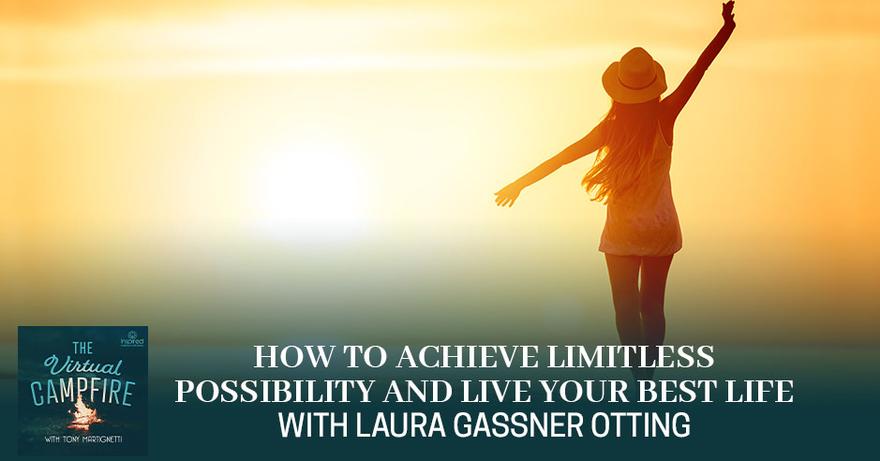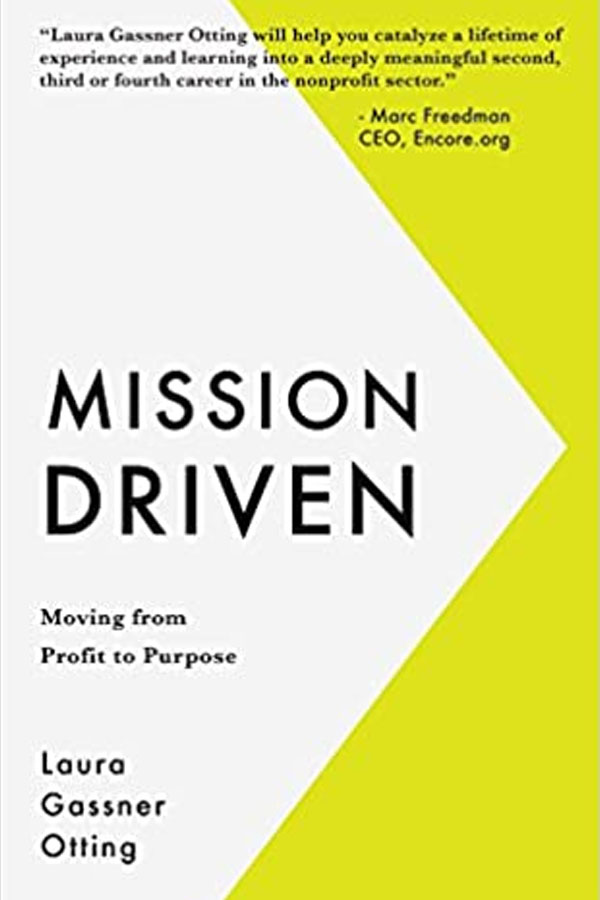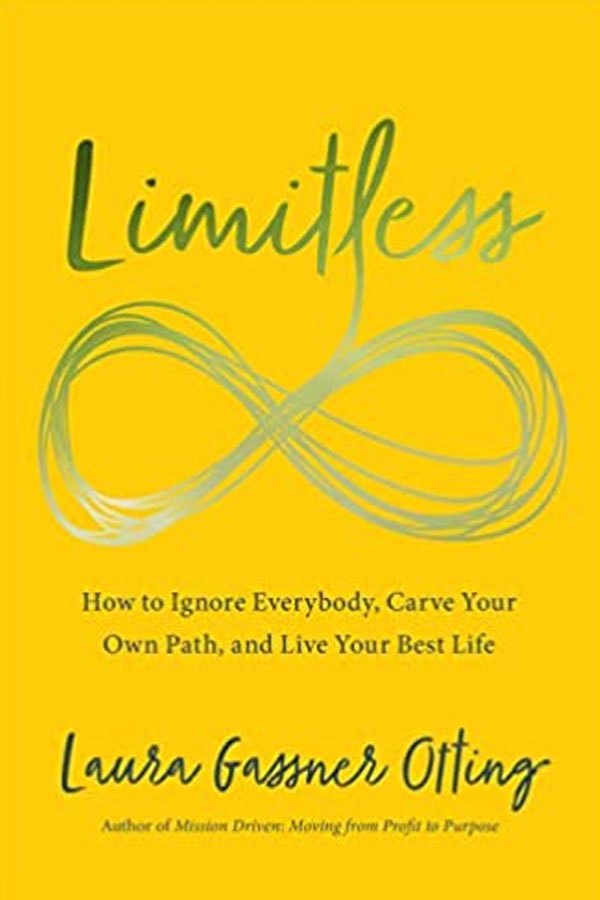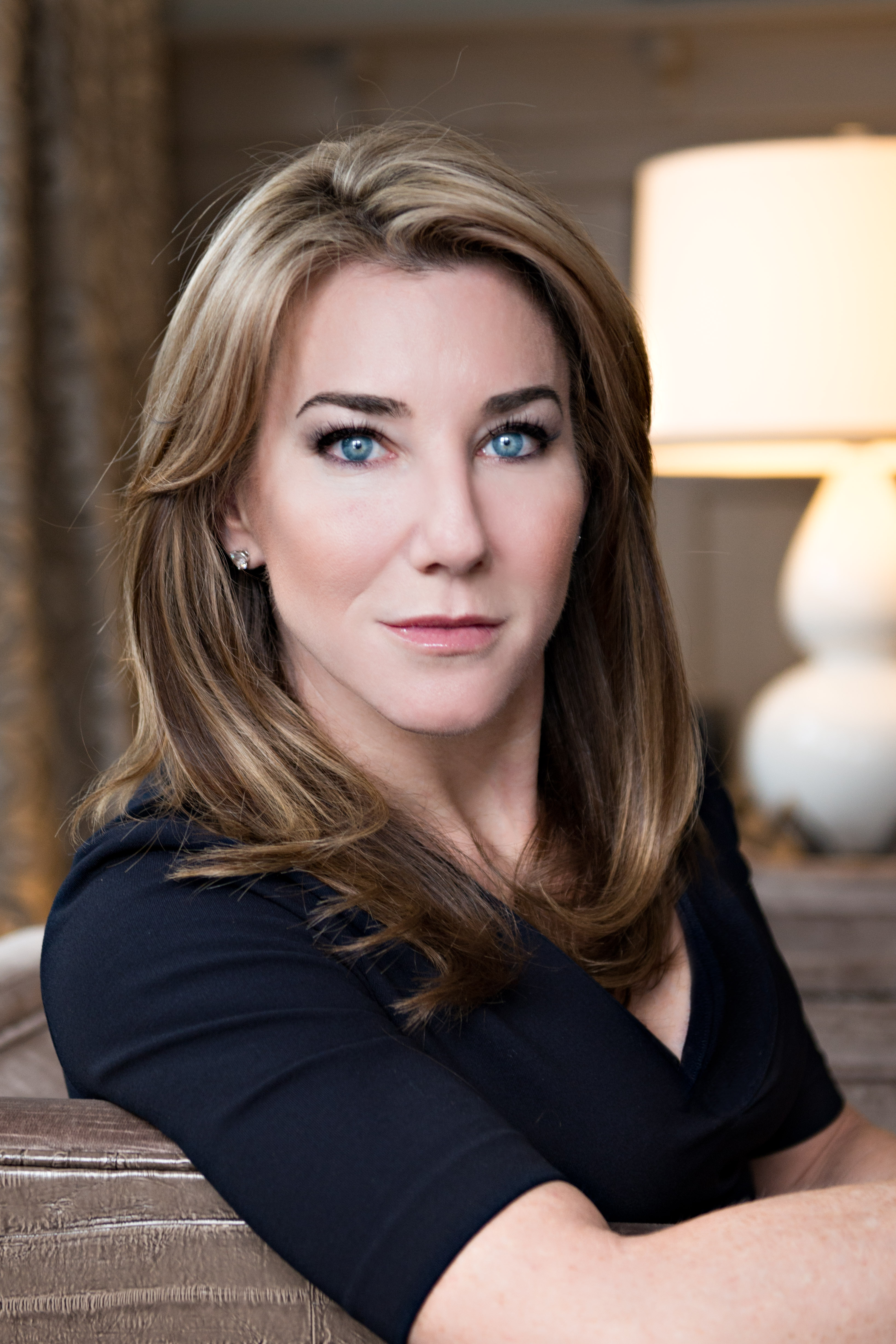How To Achieve Limitless Possibility And Live Your Best Life With Laura Gassner Otting

Embracing limitless possibility also means embracing failures. Here to shed light on how you can become limitless and live your best life is Laura Gassner Otting. Laura is a renowned author, speaker, media personality, and executive coach helping entrepreneurs, change agents, and industry leaders push past doubt that hinder great ideas. In this episode, she shares insights from her latest book, Limitless: How to Ignore Everybody, Carve your Own Path, and Live Your Best Life, which debuted at No. 2 in the Washington Post Best-Seller’s List. Join in as she chats with Tony Martignetti about defining your success, being comfortable with the uncomfortable, embracing failure, and more. Stay tuned!
---
Listen to the podcast here:
How To Achieve Limitless Possibility And Live Your Best Life With Laura Gassner Otting
It is my honor to introduce you to my guest, Laura Gassner Otting. She helps people get unstuck and achieve extraordinary results through limitless possibilities. She collaborates with change agents, entrepreneurs, investors, leaders, and donors to push past the doubt and indecision that consign great ideas to limbo. She delivers strategic thinking, well-honed wisdom and catalytic perspective informed by decades of navigating change across the startup, non-profit, political, and philanthropic landscape. She’s truly a busy person here.
She is the author of a book for those, Mission Driven: Moving from Profit to Purpose and Limitless: How to Ignore Everybody, Carve your Own Path, and Live Your Best Life. It’s of my favorite books, which debuted at number two on the Washington Post’s bestseller’s list right behind Michelle Obama and which Good Morning America, Robin Roberts chose as one of her favorite books in 2019. It is my pleasure to welcome you to the show, Laura.
It's so great to be here.
I'm thrilled to have you on. It has been my pleasure to get to know you and see the impact that you have made on the world. As we do on the show to often unwind, how did the person get here? How did they arrive in this place where they are making an impact in the world? Truly, you have been making an impact for many years. That's what we are going to do.
I think you just call me old.
It’s not the years in your life but the life in your years.
No.
I’m kidding. I’m a huge fan of RuPaul's Drag Race. I watched it with my son. There's a chapter in the world of RuPaul's Drag Race called Queen of the Universe. One of the drag queens is 42 years old. When she came on stage, they were like, “You have a lot of experience.” She was like, “Did you just call me old?” I was like, “I’ve got to remember that.”
In this day and age, 42 is young. I was reflecting on the fact that Betty White passed away. It's amazing to see how much life she put into her life. That's wild.
My grandmother passed away years ago at 93 and 3/4. She wanted to make it to 94. She had a hard early and middle part of her life and then found much more happiness later in life. She used to say every day, “Above ground is a good day.” That woman was learning how to play Blackjack when she had a fatal stroke that took her. She lived, even when she couldn't live.
Early on she couldn't do what she wanted to do because she was constrained by a sick husband, a daughter with polio, or living in a society that didn't think women could do much of anything other than be wives, nurses or teachers. Nurses, teachers, and wives are great but those were the only options that were available to her.
She didn't let that stop her. She made sure to live when she could. As I was turning 40, I ran the first mile of my life. I found my inner athlete. I ended up a couple of years later running in the Boston Marathon. It’s the first marathon of my life. I put her name on my arm. My running coach pulled me over at mile 16, right before you make the turn at mile 17 to go up Heartbreak Hill, which is storied possible hard. It breaks the heart of marathon runners. He said, “Remember what Rosie would think.” She paired me up to Heartbreak Hill. They say, “It's not the years in your life but the life in your years.” I do think that's pretty true.

We have already stepped into the world of limitless possibilities right here. This is why you are the right person to be given these messages. It's time for us to get into your story. Let's jump in. As we do on the show, we talk about people's stories through what are called Flashpoints, points in your story that have ignited your gifts in the world. I'm going to turn it over to you in a moment to share what are the moments that have revealed who you are. You can start wherever you like and share what you would like to share but let's stop along the way and see what's showing up.
I spent twenty years of my life working as an executive recruiter. I did that work for mission-driven organizations, universities, foundations, advocacy organizations, any one of the 501(c)(3) or 501(c)(4) universe. It was my great blessing and burden that I’ve got to hear people's real stories. Nobody came to me like, “I want to increase shareholder value.” Who cares? That's boring unless you want it for shareholder value.
I could have made a lot more money doing an executive search for Coca-Cola, Hilton Hotels chains or shareholder value is where it's at. I did this work for domestic violence shelters, charter schools, foundations, the ACLU, and the organizations that specific fabric of our world. I used to get to hear from people about the mother, father, teacher, mentor or whoever it was in their life who influenced them, the diagnosis, real tragedy or something that set them on a course to make them who they are.
I believe that it's that person, the one who was shaped early on that shows up at 3:00 in the morning when the crap hits the fan. When everything goes wrong and you get a phone call from your best employee that they are quitting and from your worst board member that they are not, what do you do? It's how you were shaped when you were younger. Sometimes the apple doesn't fall far from the tree. Sometimes the apple falls and gets far away from the tree as it possibly can but it's a magnetic force one way or the other that's either pushing or pulling.
I wrote a book called Limitless: How to Ignore Everybody, Carve your Own Path, and Live Your Best Life because I was set on a path by a mother who probably wanted to go to law school and didn't have that choice. It was in the ‘50s and ‘60s. There were not a lot of lady lawyers being turned out by colleges. I had a fourth-grade teacher who told me that I was argumentative and maybe I would make a good lawyer. I watched Ally McBeal on TV and LA Law. I was like, “Susan Dey is glamorous. She’s dating Harry Hamlin. I want to be like her.” I had this idea that maybe that was the right direction.
You can lose yourself in serving others but there is so much to be found as well. It’s in that growth that we really get to become the people we are meant to be.
I graduated from high school in 1988. I watched as young child lines at gas stations when oil prices were skyrocketing. There was an oil embargo and the Iran hostage crisis. I remember thinking like, “Somebody needs to solve this problem,” and being righteously indignant that we are the greatest country in the world, yet there are a bunch of people in some other countries that are holding guns to the heads of our citizens and they can't be free. I was much younger and way more naive. I didn't understand the geopolitical like, “Let's keep them hostages until Reagan becomes president so he could let them be free,” and all of a sudden, “Reagan, yay.” I didn't understand all of that was going on back there.
In my head, I thought, “Did leaders are the ones who fix things? There are problems in the world and I want to fix them.” For the most part, a lot of those people, ironically, not Carter or Reagan, are lawyers who ran for office and ended up fixing things. I was like, “I'm going to run for Senate.” This was 1985 when I was planning this idea. The idea of a woman in the White House seemed crazy. We still have to fix that. It was one of those things where I was like, “I'm going to run for Senate. I'm going to be the first female Democratic Senator from the great State of Florida.”
I set myself on this course to go to law school. I ended up in law school. On the very first day, I looked around and was like, “I don't want to be here. I don't like what we are studying. I’m not interested in any of my peers. I don't want to be like my teacher. What is going on? I have made a huge mistake.” I did what most people do when they find themselves in a place in their life where they are very unhappy. I dated somebody terrible for me.
I used to ride my bike to campus and that day happened to be raining. This guy said, “I will give you a ride home. We will stick your bike in the back of my IROC-Z,” which tells you everything you need to know about this guy. “First, we have to stop this guy's campaign office. He's running for president.” Kids, this is what you used to do before the internet. You have to go to a strip mall in your local town, go to some local office, get a printed piece of paper and a list of issues in where the candidates sit on the issue. I was like, “Governor who, from where, Arkansas? Not a chance in hell but fine. Your car is dry. I need a ride home.”
We do it. I walked into this office. In the corner of this little teeny tiny strip mall office in Gainesville, Florida, is then Bill Clinton and he's talking about the study of service. He's saying that there is nothing wrong with America that can't be fixed with what's right with America. Flashback to twelve-year-old me, I was like, “We are the greatest country in the world. We can do it. We can fix things. We can fix these problems. I'm going to fix problems.” He says, “I'm offering as a solution service, service of ourselves to our country. You go for a couple of years and help fix a community that is not your own. Through it, you are not only improving the community but you improve yourself by serving someone else. As a result, you get college tuition, improve yourself while you are improving other people, then everybody wins.”
I was like, “That needs to happen.” This is what I gave my TEDx Talk about. It was at that moment that I switched from, “I can do it. I can help. I can solve all the problems,” to, “What needs to happen and who needs to be in the right place to get there?” I ended up becoming a head hunter years later. You can see some of the little threads already starting to form but those moments were probably some of the most formative in my life about who I am, how I respond to problems, and how I think about solutions to those problems.

You tell your story in such a very entertaining way but there's so much to it that is wrapped up in what I can imagine your values are. You value fairness and enabling people to serve in a way that's going to help move us forward as a society and people. To me, it touches on a very deep core of what we need more of in the world. There’s this quote that comes to mind around, “Losing yourself in the process of serving.” There’s something important to you. When you are serving other people, you lose yourself in that process.
You do lose yourself in that process but you find yourself also. We saw a lot of this at the beginning of the pandemic. I have finished the three-year study on what makes people happy at work. It's all based on the work that I did in recruiting and the book I wrote, Limitless. If you have read the book, you know that I talk about this idea of continence, where it's not the pursuit of happiness or success. It's the pursuit of continence, what's alignment, what's flow, and what you do matches who you are.
That continent is made up of four parts, Calling, Connection, Contribution and Control. Calling is the gravitational force that gets you out of bed in the morning, the inspiration to build the business, grow the bottom line, nurture the family, solve the problem or whatever it is. Connection, does your work connect to that calling? Are you connected? Does what's on your email and to-do list in your calendar matter? Does it get you closer to your calling?
Contribution, are you building the life that you want? Does this work contribute to your ability to manifest your values daily, to have the career trajectory you want and lifestyle you want to live? Control, how much agency do you have to affect the projects that you are working on or the teams that get assigned to you? How is your work judged and how you are rewarded for it? It's interesting because I would have thought that pre-pandemic versus post-pandemic, we would have a whole lot less control and we would want much more control. What I found is that most of these metrics, calling, connection, and contribution, stayed the same but we’ve all got more control.
Readers are like, “What? I feel totally out of control.” In so far as our work is concerned, so much of the nonsense fell away like the busy work, the stuff that didn't have a purpose, and the work that we were doing because we have always done it. All of a sudden, we were like, “Are we in a survival mode? How do we connect? How do we make sure we see each other? How do we care about each other?” We lost ourselves in serving the higher purpose of like, “We are all in this together.”
The ability to be comfortable being uncomfortable makes a huge difference.
We also found something else, which was we had more control over doing the work that mattered to us. A lot of us asked ourselves the question, “When life goes back to normal, is the life I'm going back to is normal I want?” For a lot of people, The Great Resignation is showing us. It’s a resounding no. I do think that you can lose yourself in serving others but there is so much to be found as well. It's in that growth that we get to become the people we are meant to be.
It's such a beautiful concept that you bring out here. It's almost paradoxical. We have this idea that through uncertainty, we get clarity. “How is that possible? How do we find clarity in uncertainty?” The reality is we find out what we can control and can't control. We double down on the things we can control and that allows us to stay focused.
You know that I'm a runner and a rower. Both long-distance running and rowing, whatever distance, are very painful sports. There is this idea of the pain cave where you go deep into the pain cave and figure out what you are made of at that moment. When things get hard, that's when you figure it out. The very first marathon I ran was in 2012 and it was 92 degrees on Monday.
In Boston, it's not normally 92 degrees but if you remember that day, it was 92 degrees. I have this very unexciting condition called vasovagal syncope, which means I tend to pass out often with very low blood pressure. If I get anxiety, spikes or dehydration, I tend to pass out. I ran the first mile of my life when I turned 40 and found this inner athlete in me.
I decided to run the marathon. I get to Newton Center, which is 3/4 of the way up Heartbreak Hill. You've got a little bit more to go. You are at mile 20. You've got 60 minutes if you are a slow runner like me to cover the next 6 miles or if you are a faster runner, you will do it in 30 minutes. I'm never going to do it in 30 minutes.
I get to Newton Center. A friend of mine holds up his iPhone, shows me 92 degrees and says, “Wesley Korir just finished.” He finished it like a personal best, some ridiculously fast number, even though it was 92 degrees. I remember thinking, “I'm never going to be able to finish this.” I have limped up Heartbreak Hill. I'm so tired. I don't even know my name. Somebody complimented me on the Ziploc bags of ice ahead of my job brought mile 17 that my husband gave me at mile 16. At mile 17, I couldn't even remember where they came from. I was like, “What did these get here? What a good idea.” I didn't know my name by the time I finished it.

In retrospect, I think about that moment and what it took for me to finish that marathon. It took me five and a half hours to finish that. It’s not fast. I had to go deep into my pain cave and figure out what I was made of. Here's the thing. For Wesley Korir to finish that marathon in 92 degrees at his personal best also, had to go deep into his pain cave. The depth moment of the deepest, darkest hole of your pain cave, whether you are Wesley Korir, me, you or the reader, looks and feels the same. It still feels like the hardest you are ever going to work, regardless of whether you are doing it at 4.5 or 12-minute miles. Still, you are giving it everything you have.
Even though it took him 2 hours and 15 minutes to finish the marathon and it took me 5 hours and 12 minutes to finish the marathon, we still both found the depth of our pain cave. It is in that depth of the pain cave that you realize that it's not a cave. It's a tunnel and you can come out the other side. When you come out the other side, you are like, “I'm made of more than I thought. I learned something about myself in this place. The next time I go there, I can go a little farther.” It's this ability to be comfortable being uncomfortable that makes a huge difference. When we are in service of other people or we are lost and we don't know what we are doing or when we feel completely out of control, those are the moments where we go back to this idea of your fundamental state of leadership.
I read about this in Harvard Business Review. It's like, “Who are you when you are at your very best? You are firing on all cylinders, making it rain, and closing the deal. Maybe you are having this quiet moment with a loved one. You are helping a colleague through a hard situation. You were in this moment where you could walk through fire. You can leap over tall buildings. You are at your fundamental best.” It's in these moments where if you practice being that person, you can find that person deep at the bottom of your pain cave and go into it.
Years ago, I spoke at an Army base in Japan called Camp Zama. At this point, I have been a few years into my newfound fitness journey. I said to my trainer, “I'm going to go do PT with the guys at 0600. You’ve got to make sure I'm in shape for this. What do they do?” He did some research and we realized that they do these abdominal exercises called a hollow hold, where you lay on the ground, lift your head, arms, and feet up at the same time. Your core is on the ground. You are on the ground in your back but only your abdomen is pushed into the ground. You have to hold it for as long as you possibly can. We had gotten me to the point where I was able to hold a hollow hold for three minutes.
I'm old. It was impressive as it can be. I get to Camp Zama and I’m doing calisthenics. It's cold in the morning. I'm wearing sweat pants and a sweatshirt. At that point, I'm 45. The commanding officer is like, “Stick with us as long as you can. It's okay. Don't worry about it. If you can't keep up, it's all right.” I'm doing all this stuff and I'm in pretty decent shape. I'm feeling fine. They are talking and it all smack at me. People are falling off like flies. Finally, it's me and this one other kid left. Corporately, he’s probably three days into the Army. He doesn't know what he's doing or where he is but he's huffing, puffing, and staying with it.
Failure is not fatal.
I strip off my sweats by this point. I'm wearing little shorts and joggers. You can see my six-pack. I'm there and doing it. We have to do the hollow hold at the very end. We both get on the ground and start doing this hollow hold. You could tell that he's having a hard time doing this. He’s looking over at me sweating bullets like, “I can't lose to this, old lady. What am I going to do? I'm not going to get down to military duty for the next month.”
I'm looking at him and thinking to myself like, “I'm going to let him win. You don't go to someone's house and steal their silverware.” I'm trying to figure out how long I can do it. It's a good story. All of a sudden, he stops breathing. He's holding the hollow and I'm looking over. I'm like, “Is he dead? Is he okay?” This look comes over his face. I don't know where he went but somewhere in his head, he went to his happy place. He became serene and found comfort in the discomfort.
Back on Heartbreak Hill, I was like, “My heart is going to break.” He could hold that thing for a half-hour if he had to. I don't know what kind of training he had but he knew that he had to get to that place where he was comfortable being uncomfortable. He did it. I looked at him. Fifteen seconds later, I dropped my arms and legs. I was like, “It doesn't matter how long I hold it. I'm not beating him. He figured out how to be comfortable in being uncomfortable.”
It makes me think of those challenges on Survivor. If you go on people on Survivor and you see some people who are struggling busing from the moment they get started, and then some people are calm as heck. They sit there and they are in their zone. They are past that moment of pain. They are not even there. They have left their body and have gotten another plane. I don't mean to be so Zen but the reality is when you realize that there are possibilities that are beyond what you are experiencing, you can transcend the pain and discomfort, knowing that on the other side of that, there's more to be had and experience.
I'm so impressed by people who can have the mental fortitude and are tough. It's not just grit, resilience, and being to come back. Maybe it's being older. It's having perspective. Our mutual friend, Dorie Clark, talks about The Long Game. Everything doesn't have to be now. Sometimes you have to let things play out over time. Having a sanguine attitude towards it, knowing that you are planting a lot of seeds, there is some pain here and there, and each time you have pain, confusion or uncertainty, it lays the groundwork to be okay when it's less certain when the stakes are higher.
 My next book is going to be called Wonder Hell. It's going to be about this moment that you have, where it is incredible, humbling, and wonderful that this thing I'm working on is working amazingly. Also, I have never been so exhausted in my entire life. I'm anxious, scared, full of Imposter syndrome, doubt and burnout. It's wonderful and hell. It's wonder hell.
My next book is going to be called Wonder Hell. It's going to be about this moment that you have, where it is incredible, humbling, and wonderful that this thing I'm working on is working amazingly. Also, I have never been so exhausted in my entire life. I'm anxious, scared, full of Imposter syndrome, doubt and burnout. It's wonderful and hell. It's wonder hell.
In those moments of wonder hell, you realize what you are capable of and how much more you want. Isn't that exciting? If you are okay with the uncertainty here taking a step, maybe you are okay taking 2, 3, and 4 steps later. You figure out what you can do, who's with you and not with you along the way. There are so many lessons at each new level and with each new devil.
I'm glad that you brought in this concept of what your new book is about because I love it. We need to spend an entirely new episode on that. There's so much to it that we all experience in these periods and it's also knowing who are the believers who are along the path with you, who are championing you but also knowing you enough to be able to say, “Maybe you are taking on too much that you are stretching yourself too thin.”
Where do those people sit? Some of them sit in the arena with you, on the sidelines, on your bench with you like in the training room and the press box. Those are the ones who are writing stories about you but they don't have an investment. They are mostly invested in how they look vis-a-vis your story. “Am I writing a story about her? Are my analysis and critique good?” There are a lot of people who are on the ride with you but they are not necessarily going in the same direction with you. They don't share the same goals.
Sometimes those people are people who love you. My parents love me. They have no idea what I'm capable of. When I left the White House, midway through Bill Clinton's first administration, people thought I was crazy. Nobody leaves in the middle of the administration. When I left the big marquee search firm to start my own, I just had my first baby.
They thought I was insane. When I decided to sell that company, when I could ride off into the sunset and be there forever, the work was super easy and we were busy as could be. They thought I was nuts like, “What are you doing? Why are you doing all these things? Why are you making all this stress?” The last time I lived in the same house as my parents, I was seventeen years old and I put empty milk cartons back in the refrigerator, left dirty socks on the living room floor, and forgot to fill the car with gas.
I didn't have a frontal lobe. When they think about what I'm capable of doing, they love and like me but they don't know me. When I take their advice, “You shouldn't do that,” they don't know who I am. When you run into somebody at Starbucks or something and you tell them your big, crazy, scary goal, they are like, “Tony, you can't do that. That's too scary.”
What they mean is, “I can't do that. I'm too scared,” but yet we hear them, whether it comes from love, this place of fear or jealousy. How many people do you have in your life? I hope it's not a big number but we all have some who judge your rise only in so far as it shows their fall. They comment and nitpick. It's like cancer and it gets there. Even if you don't think it bothers you, it's those mornings at 3:00 in the morning when you are like, “I don't know if I can do this. I'm uncomfortable. This pain cave feels deep.” You start hearing their voices again.
Two S words come to mind. People want to keep you Safe and Small sometimes and because of that, you have to know, “That's their perspective. I can either take it and integrate what is helpful or I could leave it and move on from this place.”
You have survived all your bad days. You have survived all of your failures. There’s a track record there. You are going to survive.
We are so committed to identity. We all have an identity and my identity is mirrored based on the identity of other people around me. I had an interesting conversation with Mark Metry, who has a podcast called Humans 2.0. He's also a Boston guy. He was telling me, “We are not who we think we are. We are who we think other people think we are.” I was like, “That is so profound.” My identity is not my identity. My identity is who you think my identity is. If you like to keep me small, I want to grow bigger. As I grew bigger if you seem to not be happy about that, is there a conflict there?
I want to take a moment and ask, if you were to think back on your journey, you have shared a lot of insights about the challenges and getting out of your comfort zone but what are the lessons you have learned about yourself along your path that you want to share with people? Maybe 1 or 2 things that you feel like you want to highlight around your self-journey.
Your fourth-grade teacher doesn't know crap about who you are and what you should be. We all have that parent, boss, teacher or even that voice in our head that's like, “I don't know.” The number one thing that I would want to share with people is that failure is not the finale. It's not fatal. It's not where we end and die. You have survived all of your bad days and failures. There's a track record right there. Failure is that place where you learn, iterate and grow. Isn't that amazing? When I was growing up, I would bring home a 99% on a test and be like, “I'm going to get in so much trouble for not getting the 1% right.”
I learned to think that getting a 99% was a failure. Not getting everything perfect is a failure. As adults, all of us have this idea of, “If I get hired for being good at something, get paid, promoted, and praised for doing that thing but if I step to the left or right and screw up, it's going to be the end of me.” We don't try new things. We don't iterate, innovate and change. We get bored and stagnate. What happens when you get bored and stagnate? You fail because of everything you are trying to avoid.
There's such a crazy feeling around that. Oftentimes when we have stepped out and been chastised for it or have been called, whether it's in a job where people have felt like, “You didn't do this right,” you have experienced that, and then you feel like you have to step back in line, it's sad because those people, leaders, bosses or whatever it may be are the ones who are holding us back in line and limiting us. It's safe and small. That's unfortunate because we have to realize that's the end of one. It's one situation that we should learn from but it shouldn't be the end.
 I gave this talk where I talked about this idea at Renaissance Weekend once in Austin, Texas. I’ve got on stage and did my whole thing. I was like, “Every failure is not the finale. It's full-grown.” I looked in the audience and there was an astronaut. It's Renaissance Weekend, so there are lots of astronauts. This particular astronaut had spoken before me in another room about his three spacewalks. I was like, “For everyone else in this room, failure is not the finale. It's full-grown but for you, ignore what I'm going to say next.”
I gave this talk where I talked about this idea at Renaissance Weekend once in Austin, Texas. I’ve got on stage and did my whole thing. I was like, “Every failure is not the finale. It's full-grown.” I looked in the audience and there was an astronaut. It's Renaissance Weekend, so there are lots of astronauts. This particular astronaut had spoken before me in another room about his three spacewalks. I was like, “For everyone else in this room, failure is not the finale. It's full-grown but for you, ignore what I'm going to say next.”
Very few of us were failures in the end. We have to learn how to get comfortable being uncomfortable. Sometimes that means stepping out and doing things that you can't always do perfectly the first time. When I was a kid, I never wanted to try anything that I couldn't do perfectly the first time. I was the typical kid who sat on the sidelines until I knew I could master something, then I would go in and do it perfectly because I had to be perfect. That's who I was. That was my identity. I have gotten much older and more mature. I am totally fine sucking at something new.
I have one last question and I asked this for all my guests. I'm dying to find out your answer for this one. What are 1 or 2 books that have had an impact on you and why?
I'm going to give you one book that's fiction, which is called Stones from the River. This book is old. It’s by an author named Ursula Hegi. She's German. The book is about a woman by the name of Trudy who was a dwarf. It takes place during World War II. Trudy works as a waitress at a coffee shop. All of the Nazi officers come to this coffee shop. It's in occupied Amsterdam. She's waiting on them. They are ignoring her because they don't think of her as a human. She will hang in there as a full person. They write her off.
They talk about all their plans in front of her. She works with the resistance and helps to overthrow the Nazis. What I took from that book is everyone is going to define us in a very particular way but that's not who we are. We write our own stories. I have always thought that book was beautiful because of the way that she decided to write her own story. It's a work of fiction and I would positively highly recommend it. It's hard to come up with another book. I have so many favorite books but I might be like a total fangirl and recommend Dorie Clark’s The Long Game.
I love Dorie. She's fantastic. She does tell a story about me in the book. That's cheesy of me to recommend. If your readers don't know her, and they must know her by now, she is so brilliant. She is a good person to think about how you want to construct who you are and what your career is going to be. This book, in particular, talks about the things that you do throughout your career, the seeds that you plant throughout your career, how to help fertilize and grow them throughout the length of your career as well. Dorie has been a great friend of mine and a solid thinker for me on the subject. Anybody who is reading this and thinking about where they want to go and who they are should think about reading this book.
Both books are fascinating. First of all, I know The Long Game. I have read it twice since it's out. The first one, what a remarkable book? I love the lessons you share because it's so cool. This has been an amazing conversation. Thank you so much for coming to the show. I'm so grateful and our readers will be, too.
Everyone’s going to define us in a very particular way but that’s not who we are. We write our own stories.
What are your books? Do you ever tell people your books?
I do sometimes. I have readers lists on my website, which I share with people. The two books that I love to mention the most are The Art of Possibility by Benjamin Zander, which I'm a huge fan of. My second book would be The Book of Mistakes by Skip Prichard. It's a book that is fictional because it's told through the story of a boy learning these lessons but it’s a great business book as well. It's a beautiful book. If you haven't read that, you should check it out. This has been brilliant. Before I let you go, I need to make sure that people know where to find you. What's the best place to find you?
All my good friends call me LGO. You can find me at HeyLGO.com. It is a shortcut to my website and @HeyLGO on all the socials. If you listen to me talk about the idea of continence, calling, connection, contribution, and control and you are like, “I need to figure that out,” there are four questions you need to ask yourself and you can find those four questions at MyFourQuestions.com.
Thank you. Thanks to the readers who are coming on the journey. I know you are taking away so many great insights. Go grab Laura's book. It is fantastic. You won't be let down. That's for sure.
Important Links:
- Mission Driven: Moving from Profit to Purpose
- Limitless: How to Ignore Everybody, Carve your Own Path, and Live Your Best Life
- TEDx Talk – Stop Asking “How Can I Help?”
- The Long Game
- Humans 2.0
- Stones from the River
- The Art of Possibility
- The Book of Mistakes
- HeyLGO.com
- @HeyLGO - Instagram
- MyFourQuestions.com
About Laura Gassner Otting
 Washington Post Best Selling Author and Motivational Keynote speaker, Laura Gassner Otting, inspires people to push past the doubt and indecision that keep great ideas in limbo because her presentations make listeners think bigger and accept greater challenges that reach beyond their limited scope of belief.
Washington Post Best Selling Author and Motivational Keynote speaker, Laura Gassner Otting, inspires people to push past the doubt and indecision that keep great ideas in limbo because her presentations make listeners think bigger and accept greater challenges that reach beyond their limited scope of belief.
She delivers strategic thinking, well-honed wisdom, and perspective generated by decades of navigating change across the start-up, nonprofit, political, as well as philanthropic landscapes. Laura dares listeners to find their voice, and generate the confidence needed to tackle larger-than-life challenges. She leads them to seek new ways of leading, managing and mentoring others.
Laura’s entrepreneurial edge has been well-honed over a 25-year career that started as a Presidential Appointee in Bill Clinton’s White House, where she helped shape AmeriCorps.
She left a leadership role at the respected nonprofit search firm, Isaacson, Miller, to expand the startup ExecSearches.com. Laura also founded and ran the Nonprofit Professionals Advisory Group, which partnered with the full gamut of mission-driven nonprofit executives, from start-up dreamers to scaling social entrepreneurs to global philanthropists. In 2015, Laura sold NPAG to the team that helped her build it, both because she was hungry for the next chapter and because she held an audacious dream of electing our nation’s first female president.
Along the way, while serving on Hillary Clinton’s National Finance Committee, she was asked to do a TEDx talk which became so popular that it launched a speaking career. Laura has spoken across the United States and internationally to universities, companies, conferences, accelerators, TEDx, and the US Military.
She is the author of Mission-Driven: Moving from Profit to Purpose (2015) and the Washington Post Best Seller Limitless: How to Ignore Everybody, Carve Your Own Path, and Live Your Best Life (2019). She lives with her husband, two teenage sons, and troublesome puppy outside of Boston, MA.
Love the show? Subscribe, rate, review, and share! https://www.inspiredpurposecoach.com/virtualcampfire


0 comments
Leave a comment
Please log in or register to post a comment